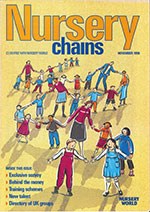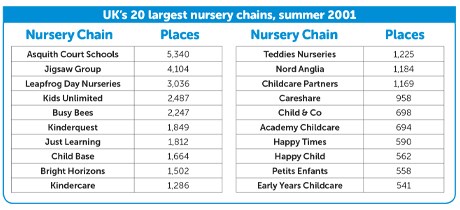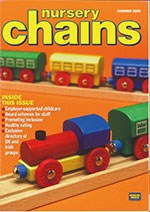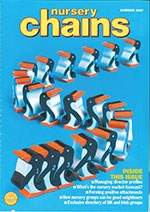Nursery Chains: Nursery Chains 1998-2018 - Chains at 20
Monday, November 12, 2018
How have the UK’s biggest nursery groups – and the early years sector as a whole – changed over the past two decades? Catherine Gaunt goes through the archives

Nursery World’s first issue of Nursery Chains was published in November 1998. Looking back through our archives to track the fortunes of the UK’s nursery groups over the past two decades also reveals the evolution of our early years sector.
1998
 Setting the scene
Setting the scene
‘Two years ago, Nursery World knew of only ten nursery chains. Now we are in contact with more than 70, and the number seems to be rising every day…The majority of nursery chains were set up in the late eighties and early nineties and have grown quickly since then: each now owns an average of seven or eight nurseries and typically employs around 100 staff. In total the groups listed in our directory employ more than 9,500 staff and own upwards of 550 nurseries, crèches and out-of-school clubs between them. Two factors are escalating the speed of growth – the Government’s commitment to a National Childcare Strategy and the increase in the number of working mothers.’
SUMMER 2000
 Does size matter?
Does size matter?
‘A one-sided war of words has been brewing in the nursery sector with the managers and owners of single-site settings accusing the chains of a range of failings including low pay, lack of training and poor management, leading to high staff turnover…
‘The fiercest retorts are provoked by the key complaint of stand-alones: that the fundamental difference between the two strands of childcare is that owner-run establishments are vocationally motivated while corporate groups are profit driven…
‘This charge is denounced as “complete bunkum” by Michael Thompson who is well placed to take an overview of the whole early years sector as managing director of Child Base, which runs 25 nurseries, and as chairman of the National Day Nurseries Association.’
SUMMER 2001
 The bigger picture
The bigger picture
‘In this issue of Nursery Chains, we have for the first time in the directory listed the total number of registered places provided by each group. This gives us a picture of how the biggest groups in the country compare.
‘Not surprisingly, Asquith Court Schools, which recently announced that it had been bought for £66m by a global investment bank, is the largest. However, some of the others in our top 20 have comparatively few branches – such as Lancashire-based Kindercare Childcare Centres, which currently runs nine nurseries. One of these, at 248 places, is the largest known to Nursery World.’
 WINTER 2002
WINTER 2002
 Neighbour-hood watch
Neighbour-hood watch
‘Its birth signalled the Government’s intent to help the most disadvantaged with childcare. But as it took its first steps doubts were raised about the long-term viability of the Neighbourhood Nurseries Initiative (NNI) as the Government only promised to nurture it through the first three years of its life. Once weaned off Government support, some of the UK’s biggest nursery chains fear the initiative will fail as bureaucratic hurdles and the chill wind of commercial unviability discourage them from taking part.’
SUMMER 2004
 Buyouts
Buyouts
‘Last month saw the merger of two of the UK’s largest nurseries, a move which commentators predict we are likely to see more of in the future.
‘Leapfrog, previously the third largest group in the UK and Ireland with 39 nurseries, has been bought by private education company Nord Anglia, instead of floating on the London Stock Exchange, which the company had originally pencilled in.’
WINTER 2004
 Joining forces
Joining forces
‘It’s all go in the private nursery sector with nursery chains continuing to consolidate and purchase other groups. Following the publication of the last Nursery Chains supplement in June we had to print an updated version of our Top 20 league table when Nord Anglia Education purchased Jigsaw Day Nurseries and replaced Asquith Court Schools as the UK’s largest provider.’
SUMMER 2005
 Helping hand
Helping hand
‘Between September and Christmas last year Busy Bees vouchers’ division received about 30 calls a day from employers and parents enquiring about the Government’s tax and national insurance exemption for those using approved childcare. Worth up to £50 a week, it came into force on 6 April 2005.
‘John Woodward, director of the Busy Bees chain, which shares around 80 per cent of the voucher business with Accor services, says telephone enquiries have grown eight-fold since then and are now running at 250 a day.’
Winter 2005
 Label it?
Label it?
‘Ashoob Cook, director of the Happy Child nursery chain, argues that it is good business sense to create a united brand image. She says: “Having a strong brand is crucial for us because we operate 18 nurseries in a small geographical area in three neighbouring London boroughs…”
‘Stephen Field, whose company Child Centred Nurseries, owns seven settings in Essex, is a strong believer in nurseries having individual identities. He explains: “Each of my nurseries plays on the strengths of the staff and high standards of care. Having a shared name would not make a difference to this.”’
SUMMER 2007
 What’s the forecast?
What’s the forecast?
‘Laing & Buisson says that the “new entrant” in the UK market, the Australia-based ABC Learning Centres, has “ambitions to drive forward consolidation in the marketplace”. ABC, which is by far the largest childcare company in the world, stunned the UK private day nursery sector in December when it bought Staffordshire-based Busy Bees, its 47 nurseries and burgeoning childcare voucher business.’
AUTUMN 2008
 At the ready
At the ready
‘With banks warning of stricter credit controls, mortgages becoming harder to obtain and the economy shrouded in gloom, it is perhaps surprising to find parts of the private day nursery sector bucking the trend and displaying some optimism.
‘The evidence comes from reports of rising occupancy levels and the declared aim of three chains in particular – Kids Unlimited, the Bertram Group and Just Learning – to expand their businesses.’
A busy year
‘The big story from the past year is the emergence of Busy Bees, which was previously the sixth largest nursery group, as overwhelmingly the dominant player in the UK nursery market.
AUTUMN 2010
 Right place at the right time
Right place at the right time
‘With Laing & Buisson (L&B) highlighting that the nursery closure rate is still way above pre-recession averages, there is no shortage of stock – but good stock is another matter. L&B cautions that with unemployment set to remain high, at above two million, growth in demand for formal childcare will be held back, particularly in certain areas of the country.’
AUTUMN 2012
In the balance
 ‘This year has seen major consolidation in the corporate nursery sector…Funding of the free entitlement is still an issue across the sector and the extension of the scheme to disadvantaged two-year-olds causes concern in part because uncertainties about finances make it difficult to plan and budget.’
‘This year has seen major consolidation in the corporate nursery sector…Funding of the free entitlement is still an issue across the sector and the extension of the scheme to disadvantaged two-year-olds causes concern in part because uncertainties about finances make it difficult to plan and budget.’
Then and now
‘“Looking back at the beginning more than 20 years ago, I only remember laughing all day long and the paperwork was limited,” says Lynda Gostelow, operations director for the 41 nurseries of the Childbase Partnership. “Reports were simply brief notes on individual ‘activity scrapbooks’ and there were cosy, end-of-day chats with parents.
‘“Parents’ expectations of childcare were very different. Most just wanted a clean, safe and fun environment with kindly carers – the ‘home from home’ approach.”
‘Record-keeping and regulation are the most obvious markers by which many providers measure their journey from past to present. Zoe Raven, managing director at Acorn Childcare, which she founded in 1989, says, “There’s a lot of paperwork now because everyone is scared to death of legislation. Regulations have changed from when nurseries were under social services, whose role was different from Ofsted. Social services had advisers you could go to for support, not just inspections.”’
AUTUMN 2013
 Making links
Making links
‘Nursery groups are embracing digital technology as a way of developing relationships with parents and boosting business.
‘The majority of nurseries now use social media, such as Facebook and Twitter, to provide parents with up-to-date information about what is happening at a setting and inform them about their child’s day. It is proving a powerful way of helping parents to feel they are staying close to their child.
‘Manager of Snapdragons’ Grosvenor Nursery in Bath, Lyndsey Tanner, who won Nursery Manager of the year at the Nursery World Awards 2013, sends individual tweets to parents and links to photos of their children on the group’s website…“Lots of our parents are following us on Twitter and some have created accounts especially,” she says. “Sending a tweet can instantly help reassure them about their child. This morning I had one child who was upset. When he was okay I tweeted mum and dad to tell them he was happy.”’
AUTUMN 2014
 Centre stage
Centre stage
‘Nursery chains have embraced Early Years Teacher Status (EYTS), the latest Government qualification designed to raise standards and increase public recognition for the sector…For chains EYTs can offer a key means of upgrading practice. They can lead staff training, relieve the pressure on managers and boost the confidence of all staff. But concern remains that the EYT qualification, though vaunted as “equivalent” to QTS by politicians, does not carry with it the same pay and conditions.’
AUTUMN 2015
 Doubling up
Doubling up
‘Earlier this year, the Government asked childcare providers and local authorities to volunteer to be among the first to double the funded hours of childcare for working parents…Bertram Nursery Group, which has 16 settings in England, is one of those providers. The chain has put itself forward…but its interest in taking part is not unalloyed with concerns.
“Through the process, Bertram hopes to learn and share more about how the scheme can be implemented, as well as participating in feedback to ensure the implementation does not happen at the expense of nursery providers,” says Cary Rankin, managing director, England at Bertram Nursery Group. “Many are already struggling with the costs associated with running 15 hours funded places.”’
{"@context":"https://schema.org","@type":"Article","mainEntityOfPage":{"@type":"WebPage","@id":"https://google.com/article"},"headline":"Nursery Chains: Nursery Chains 1998-2018 - Chains at 20","datePublished":"11/12/2018 12:00:00 AM","abstract":"How have the UK’s biggest nursery groups – and the early years sector as a whole – changed over the past two decades? Catherine Gaunt goes through the archives","articleBody":"\u003cp\u003e\u003cem\u003eNursery World\u003c/em\u003e’s first issue of \u003cem\u003eNursery Chains\u003c/em\u003e was published in November 1998. Looking back through our archives to track the fortunes of the UK’s nursery groups over the past two decades also reveals the evolution of our early years sector.\u003c/p\u003e\n\u003cul\u003e\n\u003cli\u003e\u003cstrong\u003e\u003ca rel=\u0022noopener\u0022 data-udi=\u0022umb://media/be14d29013ea453694edb262b713eaf5\u0022 href=\u0022/media/98778/004_nc_20-years-of-chains.pdf\u0022 target=\u0022_blank\u0022\u003eDownload the PDF: Chains at 20\u003c/a\u003e\u003c/strong\u003e\u003c/li\u003e\n\u003c/ul\u003e\n\u003cp\u003e\u003cstrong\u003e1998\u003c/strong\u003e\u003c/p\u003e\n\u003cp\u003e\u003cstrong\u003e\u003cimg style=\u0022float: right;\u0022 class=\u0022right\u0022 src=\u0022/media/94792/chains-autumn-1998.jpg?width=150\u0026amp;height=212\u0022 border=\u00220\u0022 alt=\u0022chains-autumn-1998\u0022 title=\u0022chains-autumn-1998\u0022 width=\u0022150\u0022 height=\u0022212\u0022 data-udi=\u0022umb://media/8a3edc01d2724435bc172741715af332\u0022\u003eSetting the scene\u003c/strong\u003e\u003c/p\u003e\n\u003cp\u003e‘Two years ago, Nursery World knew of only ten nursery chains. Now we are in contact with more than 70, and the number seems to be rising every day…The majority of nursery chains were set up in the late eighties and early nineties and have grown quickly since then: each now owns an average of seven or eight nurseries and typically employs around 100 staff. In total the groups listed in our directory employ more than 9,500 staff and own upwards of 550 nurseries, crèches and out-of-school clubs between them. Two factors are escalating the speed of growth – the Government’s commitment to a National Childcare Strategy and the increase in the number of working mothers.’\u003c/p\u003e\n\u003cp\u003e\u003cstrong\u003eSUMMER 2000\u003c/strong\u003e\u003c/p\u003e\n\u003cp\u003e\u003cstrong\u003e\u003cimg style=\u0022float: right;\u0022 class=\u0022right\u0022 src=\u0022/media/94932/chains-summer-2000.jpg?width=150\u0026amp;height=212\u0022 border=\u00220\u0022 alt=\u0022chains-summer-2000\u0022 title=\u0022chains-summer-2000\u0022 width=\u0022150\u0022 height=\u0022212\u0022 data-udi=\u0022umb://media/85a7ccc121ff4df7a933b7eab9634b0d\u0022\u003eDoes size matter?\u003c/strong\u003e\u003c/p\u003e\n\u003cp\u003e‘A one-sided war of words has been brewing in the nursery sector with the managers and owners of single-site settings accusing the chains of a range of failings including low pay, lack of training and poor management, leading to high staff turnover…\u003c/p\u003e\n\u003cp\u003e‘The fiercest retorts are provoked by the key complaint of stand-alones: that the fundamental difference between the two strands of childcare is that owner-run establishments are vocationally motivated while corporate groups are profit driven…\u003c/p\u003e\n\u003cp\u003e‘This charge is denounced as “complete bunkum” by Michael Thompson who is well placed to take an overview of the whole early years sector as managing director of Child Base, which runs 25 nurseries, and as chairman of the National Day Nurseries Association.’\u003c/p\u003e\n\u003cp\u003e\u003cstrong\u003eSUMMER 2001\u003c/strong\u003e\u003c/p\u003e\n\u003cp\u003e\u003cstrong\u003e\u003cimg style=\u0022float: right;\u0022 class=\u0022right\u0022 src=\u0022/media/94793/chains-summer-2001.jpg?width=150\u0026amp;height=217\u0022 border=\u00220\u0022 alt=\u0022chains-summer-2001\u0022 title=\u0022chains-summer-2001\u0022 width=\u0022150\u0022 height=\u0022217\u0022 data-udi=\u0022umb://media/28359754636d4c339ee0a9db03791955\u0022\u003eThe bigger picture\u003c/strong\u003e\u003c/p\u003e\n\u003cp\u003e‘In this issue of \u003cem\u003eNursery Chains\u003c/em\u003e, we have for the first time in the directory listed the total number of registered places provided by each group. This gives us a picture of how the biggest groups in the country compare.\u003c/p\u003e\n\u003cp\u003e‘Not surprisingly, Asquith Court Schools, which recently announced that it had been bought for £66m by a global investment bank, is the largest. However, some of the others in our top 20 have comparatively few branches – such as Lancashire-based Kindercare Childcare Centres, which currently runs nine nurseries. One of these, at 248 places, is the largest known to \u003cem\u003eNursery World\u003c/em\u003e.’\u003c/p\u003e\n\u003cp\u003e\u003cstrong\u003e\u003cimg class=\u0022center\u0022 src=\u0022/media/94833/uk-s-20-largest-nursery-chains-2001.jpg?width=460\u0026amp;height=210\u0022 border=\u00220\u0022 alt=\u0022uk-s-20-largest-nursery-chains-2001\u0022 title=\u0022uk-s-20-largest-nursery-chains-2001\u0022 width=\u0022460\u0022 height=\u0022210\u0022 data-udi=\u0022umb://media/4e528fb35f8d4cc9b5c84b34827f9b0e\u0022\u003eWINTER 2002\u003c/strong\u003e\u003c/p\u003e\n\u003cp\u003e\u003cstrong\u003e\u003cimg style=\u0022float: right;\u0022 class=\u0022right\u0022 src=\u0022/media/94853/chains-winter-2002.jpg?width=150\u0026amp;height=212\u0022 border=\u00220\u0022 alt=\u0022chains-winter-2002\u0022 title=\u0022chains-winter-2002\u0022 width=\u0022150\u0022 height=\u0022212\u0022 data-udi=\u0022umb://media/a23777977e9d48bbb6f5ad744ca90c6e\u0022\u003eNeighbour-hood watch\u003c/strong\u003e\u003c/p\u003e\n\u003cp\u003e‘Its birth signalled the Government’s intent to help the most disadvantaged with childcare. But as it took its first steps doubts were raised about the long-term viability of the Neighbourhood Nurseries Initiative (NNI) as the Government only promised to nurture it through the first three years of its life. Once weaned off Government support, some of the UK’s biggest nursery chains fear the initiative will fail as bureaucratic hurdles and the chill wind of commercial unviability discourage them from taking part.’\u003c/p\u003e\n\u003cp\u003e\u003cstrong\u003eSUMMER 2004\u003c/strong\u003e\u003c/p\u003e\n\u003cp\u003e\u003cstrong\u003e\u003cimg style=\u0022float: right;\u0022 class=\u0022right\u0022 src=\u0022/media/94790/chains-summer-2004.jpg?width=150\u0026amp;height=212\u0022 border=\u00220\u0022 alt=\u0022chains-summer-2004\u0022 title=\u0022chains-summer-2004\u0022 width=\u0022150\u0022 height=\u0022212\u0022 data-udi=\u0022umb://media/e6e489f05af54b6b91c9019a80f2c5bb\u0022\u003eBuyouts\u003c/strong\u003e\u003c/p\u003e\n\u003cp\u003e‘Last month saw the merger of two of the UK’s largest nurseries, a move which commentators predict we are likely to see more of in the future.\u003c/p\u003e\n\u003cp\u003e‘Leapfrog, previously the third largest group in the UK and Ireland with 39 nurseries, has been bought by private education company Nord Anglia, instead of floating on the London Stock Exchange, which the company had originally pencilled in.’\u003c/p\u003e\n\u003cp\u003e\u003cstrong\u003eWINTER 2004\u003c/strong\u003e\u003c/p\u003e\n\u003cp\u003e\u003cstrong\u003e\u003cimg style=\u0022float: right;\u0022 class=\u0022right\u0022 src=\u0022/media/94933/chains-winter-2004.jpg?width=150\u0026amp;height=212\u0022 border=\u00220\u0022 alt=\u0022chains-winter-2004\u0022 title=\u0022chains-winter-2004\u0022 width=\u0022150\u0022 height=\u0022212\u0022 data-udi=\u0022umb://media/64efccc37c184589a7c2aef1e641e855\u0022\u003eJoining forces\u003c/strong\u003e\u003c/p\u003e\n\u003cp\u003e‘It’s all go in the private nursery sector with nursery chains continuing to consolidate and purchase other groups. Following the publication of the last Nursery Chains supplement in June we had to print an updated version of our Top 20 league table when Nord Anglia Education purchased Jigsaw Day Nurseries and replaced Asquith Court Schools as the UK’s largest provider.’\u003c/p\u003e\n\u003cp\u003e\u003cstrong\u003eSUMMER 2005\u003c/strong\u003e\u003c/p\u003e\n\u003cp\u003e\u003cstrong\u003e\u003cimg style=\u0022float: right;\u0022 class=\u0022right\u0022 src=\u0022/media/94783/summer-2005.jpg?width=150\u0026amp;height=212\u0022 border=\u00220\u0022 alt=\u0022summer-2005\u0022 title=\u0022summer-2005\u0022 width=\u0022150\u0022 height=\u0022212\u0022 data-udi=\u0022umb://media/d83d01f8e8bf42e0b4124a059ff771b8\u0022\u003eHelping hand\u003c/strong\u003e\u003c/p\u003e\n\u003cp\u003e‘Between September and Christmas last year Busy Bees vouchers’ division received about 30 calls a day from employers and parents enquiring about the Government’s tax and national insurance exemption for those using approved childcare. Worth up to £50 a week, it came into force on 6 April 2005.\u003c/p\u003e\n\u003cp\u003e‘John Woodward, director of the Busy Bees chain, which shares around 80 per cent of the voucher business with Accor services, says telephone enquiries have grown eight-fold since then and are now running at 250 a day.’\u003c/p\u003e\n\u003cp\u003e\u003cstrong\u003eWinter 2005\u003c/strong\u003e\u003c/p\u003e\n\u003cp\u003e\u003cstrong\u003e\u003cimg style=\u0022float: right;\u0022 class=\u0022right\u0022 src=\u0022/media/94934/winter-2005.jpg?width=150\u0026amp;height=213\u0022 border=\u00220\u0022 alt=\u0022winter-2005\u0022 title=\u0022winter-2005\u0022 width=\u0022150\u0022 height=\u0022213\u0022 data-udi=\u0022umb://media/a2ce0306eb5044aa9e089e9fa510b207\u0022\u003eLabel it?\u003c/strong\u003e\u003c/p\u003e\n\u003cp\u003e‘Ashoob Cook, director of the Happy Child nursery chain, argues that it is good business sense to create a united brand image. She says: “Having a strong brand is crucial for us because we operate 18 nurseries in a small geographical area in three neighbouring London boroughs…”\u003c/p\u003e\n\u003cp\u003e‘Stephen Field, whose company Child Centred Nurseries, owns seven settings in Essex, is a strong believer in nurseries having individual identities. He explains: “Each of my nurseries plays on the strengths of the staff and high standards of care. Having a shared name would not make a difference to this.”’\u003c/p\u003e\n\u003cp\u003e\u003cstrong\u003eSUMMER 2007\u003c/strong\u003e\u003c/p\u003e\n\u003cp\u003e\u003cstrong\u003e\u003cimg style=\u0022float: right;\u0022 class=\u0022right\u0022 src=\u0022/media/94854/chains-summer-2007.jpg?width=150\u0026amp;height=212\u0022 border=\u00220\u0022 alt=\u0022chains-summer-2007\u0022 title=\u0022chains-summer-2007\u0022 width=\u0022150\u0022 height=\u0022212\u0022 data-udi=\u0022umb://media/6d8f4679582b4472a0381ca0cb8e5aaf\u0022\u003eWhat’s the forecast?\u003c/strong\u003e\u003c/p\u003e\n\u003cp\u003e‘Laing \u0026amp;amp; Buisson says that the “new entrant” in the UK market, the Australia-based ABC Learning Centres, has “ambitions to drive forward consolidation in the marketplace”. ABC, which is by far the largest childcare company in the world, stunned the UK private day nursery sector in December when it bought Staffordshire-based Busy Bees, its 47 nurseries and burgeoning childcare voucher business.’\u003c/p\u003e\n\u003cp\u003e\u003cstrong\u003eAUTUMN 2008\u003c/strong\u003e\u003c/p\u003e\n\u003cp\u003e\u003cstrong\u003e\u003cimg style=\u0022float: right;\u0022 class=\u0022right\u0022 src=\u0022/media/94941/chains-autumn-2008.jpg?width=150\u0026amp;height=212\u0022 border=\u00220\u0022 alt=\u0022chains-autumn-2008\u0022 title=\u0022chains-autumn-2008\u0022 width=\u0022150\u0022 height=\u0022212\u0022 data-udi=\u0022umb://media/ea94722f29634a2fb6e5a77e3454fed5\u0022\u003eAt the ready\u003c/strong\u003e\u003c/p\u003e\n\u003cp\u003e‘With banks warning of stricter credit controls, mortgages becoming harder to obtain and the economy shrouded in gloom, it is perhaps surprising to find parts of the private day nursery sector bucking the trend and displaying some optimism.\u003c/p\u003e\n\u003cp\u003e‘The evidence comes from reports of rising occupancy levels and the declared aim of three chains in particular – Kids Unlimited, the Bertram Group and Just Learning – to expand their businesses.’\u003c/p\u003e\n\u003cp\u003e\u003cstrong\u003eA busy year\u003c/strong\u003e\u003c/p\u003e\n\u003cp\u003e‘The big story from the past year is the emergence of Busy Bees, which was previously the sixth largest nursery group, as overwhelmingly the dominant player in the UK nursery market.\u003c/p\u003e\n\u003cp\u003e\u003cstrong\u003eAUTUMN 2010\u003c/strong\u003e\u003c/p\u003e\n\u003cp\u003e\u003cstrong\u003e\u003cimg style=\u0022float: right;\u0022 class=\u0022right\u0022 src=\u0022/media/94784/chains-autumn-2010.jpg?width=150\u0026amp;height=212\u0022 border=\u00220\u0022 alt=\u0022chains-autumn-2010\u0022 title=\u0022chains-autumn-2010\u0022 width=\u0022150\u0022 height=\u0022212\u0022 data-udi=\u0022umb://media/fbf012b3659740ee8b7e66b0f8dc1d4b\u0022\u003eRight place at the right time\u003c/strong\u003e\u003c/p\u003e\n\u003cp\u003e‘With Laing \u0026amp;amp; Buisson (L\u0026amp;amp;B) highlighting that the nursery closure rate is still way above pre-recession averages, there is no shortage of stock – but good stock is another matter. L\u0026amp;amp;B cautions that with unemployment set to remain high, at above two million, growth in demand for formal childcare will be held back, particularly in certain areas of the country.’\u003c/p\u003e\n\u003cp\u003e\u003cstrong\u003eAUTUMN 2012\u003c/strong\u003e\u003c/p\u003e\n\u003cp\u003e\u003cstrong\u003eIn the balance\u003c/strong\u003e\u003c/p\u003e\n\u003cp\u003e\u003cimg style=\u0022float: right;\u0022 class=\u0022right\u0022 src=\u0022/media/94935/chains-autumn-2012.jpg?width=150\u0026amp;height=212\u0022 border=\u00220\u0022 alt=\u0022chains-autumn-2012\u0022 title=\u0022chains-autumn-2012\u0022 width=\u0022150\u0022 height=\u0022212\u0022 data-udi=\u0022umb://media/cd227328ea884db0ac86ad7eb90844ff\u0022\u003e‘This year has seen major consolidation in the corporate nursery sector…Funding of the free entitlement is still an issue across the sector and the extension of the scheme to disadvantaged two-year-olds causes concern in part because uncertainties about finances make it difficult to plan and budget.’\u003c/p\u003e\n\u003cp\u003e\u003cstrong\u003eThen and now\u003c/strong\u003e\u003c/p\u003e\n\u003cp\u003e‘“Looking back at the beginning more than 20 years ago, I only remember laughing all day long and the paperwork was limited,” says Lynda Gostelow, operations director for the 41 nurseries of the Childbase Partnership. “Reports were simply brief notes on individual ‘activity scrapbooks’ and there were cosy, end-of-day chats with parents.\u003c/p\u003e\n\u003cp\u003e‘“Parents’ expectations of childcare were very different. Most just wanted a clean, safe and fun environment with kindly carers – the ‘home from home’ approach.”\u003c/p\u003e\n\u003cp\u003e‘Record-keeping and regulation are the most obvious markers by which many providers measure their journey from past to present. Zoe Raven, managing director at Acorn Childcare, which she founded in 1989, says, “There’s a lot of paperwork now because everyone is scared to death of legislation. Regulations have changed from when nurseries were under social services, whose role was different from Ofsted. Social services had advisers you could go to for support, not just inspections.”’\u003c/p\u003e\n\u003cp\u003e\u003cstrong\u003eAUTUMN 2013\u003c/strong\u003e\u003c/p\u003e\n\u003cp\u003e\u003cstrong\u003e\u003cimg style=\u0022float: right;\u0022 class=\u0022right\u0022 src=\u0022/media/94785/chains-2013.jpg?width=150\u0026amp;height=206\u0022 border=\u00220\u0022 alt=\u0022chains-2013\u0022 title=\u0022chains-2013\u0022 width=\u0022150\u0022 height=\u0022206\u0022 data-udi=\u0022umb://media/a544d9a177dd4160bc380173d9a17539\u0022\u003eMaking links\u003c/strong\u003e\u003c/p\u003e\n\u003cp\u003e‘Nursery groups are embracing digital technology as a way of developing relationships with parents and boosting business.\u003c/p\u003e\n\u003cp\u003e‘The majority of nurseries now use social media, such as Facebook and Twitter, to provide parents with up-to-date information about what is happening at a setting and inform them about their child’s day. It is proving a powerful way of helping parents to feel they are staying close to their child.\u003c/p\u003e\n\u003cp\u003e‘Manager of Snapdragons’ Grosvenor Nursery in Bath, Lyndsey Tanner, who won Nursery Manager of the year at the Nursery World Awards 2013, sends individual tweets to parents and links to photos of their children on the group’s website…“Lots of our parents are following us on Twitter and some have created accounts especially,” she says. “Sending a tweet can instantly help reassure them about their child. This morning I had one child who was upset. When he was okay I tweeted mum and dad to tell them he was happy.”’\u003c/p\u003e\n\u003cp\u003e\u003cstrong\u003eAUTUMN 2014\u003c/strong\u003e\u003c/p\u003e\n\u003cp\u003e\u003cstrong\u003e\u003cimg style=\u0022float: right;\u0022 class=\u0022right\u0022 src=\u0022/media/94942/chains-2014.jpg?width=150\u0026amp;height=199\u0022 border=\u00220\u0022 alt=\u0022chains-2014\u0022 title=\u0022chains-2014\u0022 width=\u0022150\u0022 height=\u0022199\u0022 data-udi=\u0022umb://media/86217c7338a3488eafb8a7c0d5eac7c1\u0022\u003eCentre stage\u003c/strong\u003e\u003c/p\u003e\n\u003cp\u003e‘Nursery chains have embraced Early Years Teacher Status (EYTS), the latest Government qualification designed to raise standards and increase public recognition for the sector…For chains EYTs can offer a key means of upgrading practice. They can lead staff training, relieve the pressure on managers and boost the confidence of all staff. But concern remains that the EYT qualification, though vaunted as “equivalent” to QTS by politicians, does not carry with it the same pay and conditions.’\u003c/p\u003e\n\u003cp\u003e\u003cstrong\u003eAUTUMN 2015\u003c/strong\u003e\u003c/p\u003e\n\u003cp\u003e\u003cstrong\u003e\u003cimg style=\u0022float: right;\u0022 class=\u0022right\u0022 src=\u0022/media/94936/chains-2015.jpg?width=150\u0026amp;height=207\u0022 border=\u00220\u0022 alt=\u0022chains-2015\u0022 title=\u0022chains-2015\u0022 width=\u0022150\u0022 height=\u0022207\u0022 data-udi=\u0022umb://media/0aebed87be8643c69d6e37e079d95c23\u0022\u003eDoubling up\u003c/strong\u003e\u003c/p\u003e\n\u003cp\u003e‘Earlier this year, the Government asked childcare providers and local authorities to volunteer to be among the first to double the funded hours of childcare for working parents…Bertram Nursery Group, which has 16 settings in England, is one of those providers. The chain has put itself forward…but its interest in taking part is not unalloyed with concerns.\u003c/p\u003e\n\u003cp\u003e“Through the process, Bertram hopes to learn and share more about how the scheme can be implemented, as well as participating in feedback to ensure the implementation does not happen at the expense of nursery providers,” says Cary Rankin, managing director, England at Bertram Nursery Group. “Many are already struggling with the costs associated with running 15 hours funded places.”’\u003c/p\u003e\n\u003c![CDATA[\n]]"}








